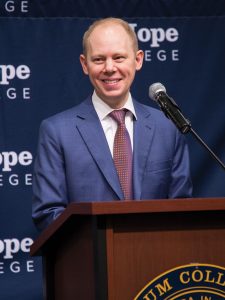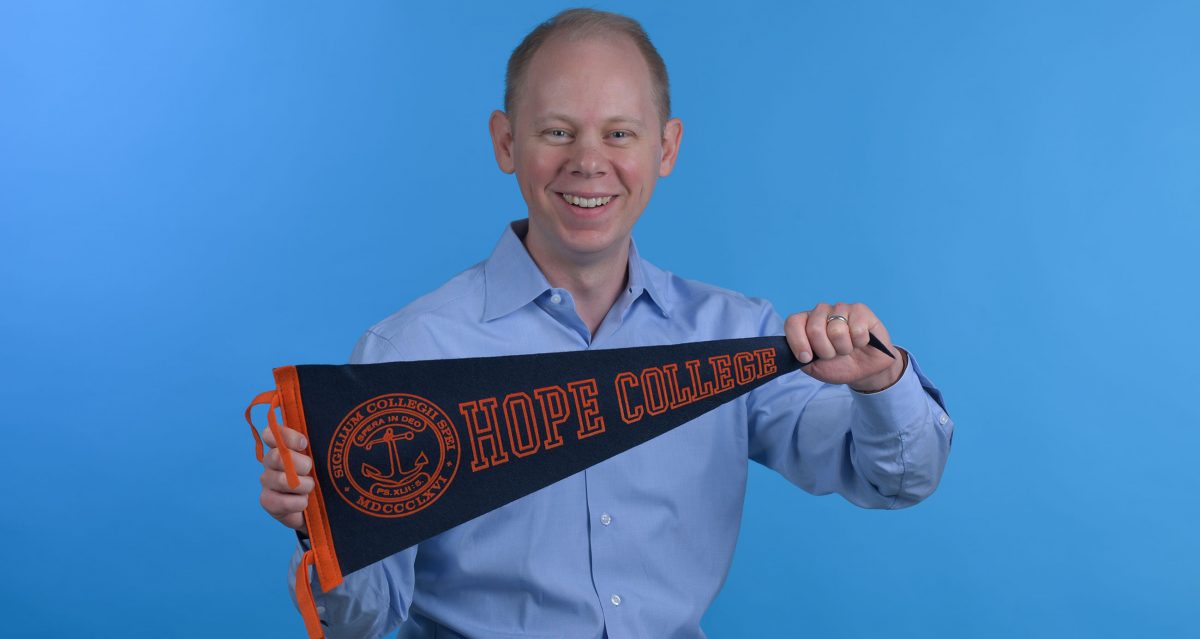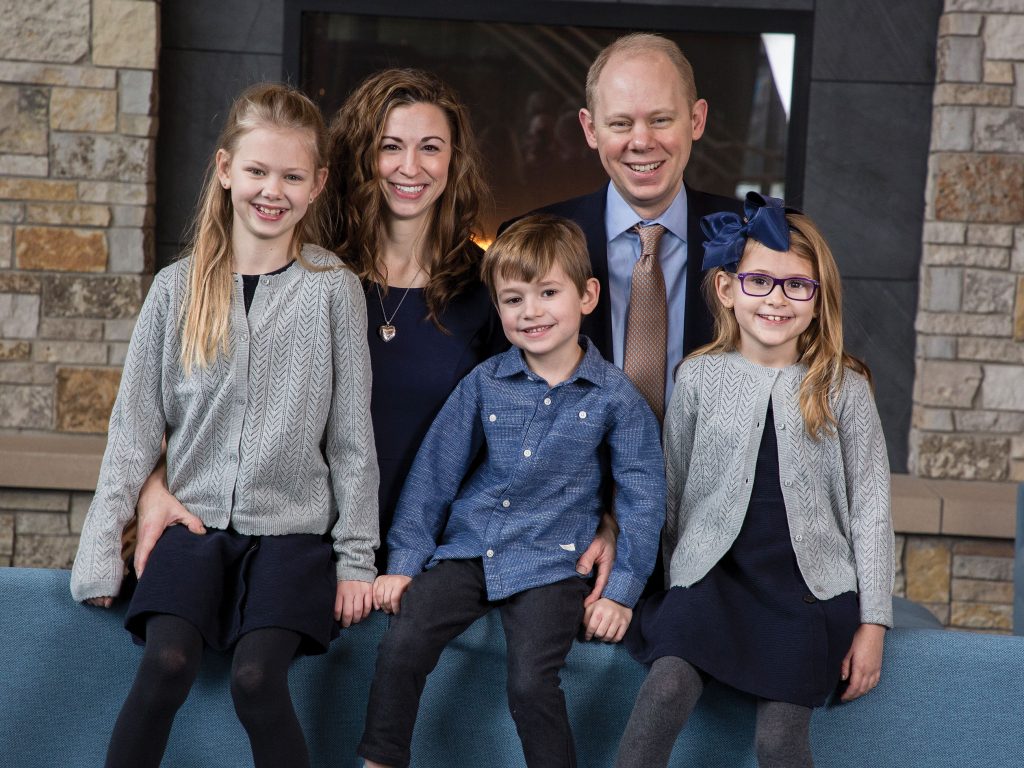“The Perfect Leader for Hope’s Next Chapter”
Matthew A. Scogin ’02 named 14th president

It is telling that when Matthew A. Scogin ’02 spoke to the college’s staff in November as a presidential candidate, the crowd that packed the room seemed ready to stand up and cheer.
His heartfelt understanding of, and appreciation for, Hope had that strong an effect.
“As a proud and grateful alumnus, I believe in what Hope stands for and its ability to change a life. It changed mine,” he said. “Hope’s faculty invested in me, mentored me and taught me how to learn. Hope’s academics prepared me for a rigorous graduate school program at Harvard and a research fellowship in Germany. Hope’s liberal arts curriculum gave me the broad-based skills to pursue an interdisciplinary career in government, business and the non-profit sector. And Hope’s Christian mission inspired me to view even my secular work as having a very sacred purpose.”
Scogin, subsequently elected the college’s 14th president by the Board of Trustees in December, also readily acknowledged that in one obvious respect he was an unusual choice: His career hasn’t been in higher education. He is currently chief administrative officer at the global financial advisory firm of Perella Weinberg Partners in New York City, and had previously held senior positions with both the New York Stock Exchange and the U.S. Treasury Department. That’s not the trajectory through the academy that typically culminates in a college presidency.
“One of the things I said to the search committee while they were in this process is that I don’t have an interest in being a college president,” said Scogin, who will take office on July 1. “What I’m interested in is being Hope’s president. And for me this was really about a chance to come back and serve Hope College with the skills that I have developed through the career opportunities that my Hope education made possible in the first place.”
Scogin was selected following an international search that yielded applicants from around the country and abroad, including presidents and senior administrators at other colleges and universities as well as in other professional fields. His experience as an innovative leader, coupled with his passion and vision for the college, made him the clear choice. He also comes to the office familiar with the needs and challenges facing Hope and higher education, having served as a member of the board since 2016.
“As a strategic thinker who has worked on the most important economic and social issues facing our nation, Matt will bring intellectual depth and visionary leadership to Hope College,” said board chair Karl Droppers ’82. “Matt personifies the mission of Hope, as he has led a life of leadership and service at the highest levels of business and government. He is also a passionate follower of Christ, brings a strong commitment to inclusive excellence and diversity, and articulates the college’s mission with contagious and inspiring enthusiasm. This makes him the perfect leader for Hope’s next chapter.”
Scogin has been with Perella Weinberg Partners since 2014. He oversees operations, strategy, corporate services, human resources and communications at the firm, which has 11 offices around the world.
Prior to his current position, he was at NYSE Euronext, where from 2009 to 2014 he served as the senior vice president and chief of staff at the 3,000-person company that ran the New York Stock Exchange and five exchanges in Europe. During 2008 and 2009, he was chief of staff and senior adviser to the CEO of Wachovia Bank, at the time the nation’s fourth-largest commercial bank.
Before joining the corporate sector, Scogin occupied several senior roles in government. From 2006 to 2008, he was the senior adviser for domestic finance at the U.S. Department of Treasury, where he counseled the secretary of the treasury and undersecretary of the treasury on a broad range of economic and financial policy matters. In 2006, he served as a fiscal policy adviser to the governor of Massachusetts; from 2002 to 2003, he was the legislative director for a Michigan state representative; and during 2001, while participating in Hope College’s Washington Honors Semester, he held an internship at the White House.
Scogin majored in political science and economics at Hope, where he was Student Congress president during his senior year, and has a master’s degree in public policy from the Kennedy School of Government at Harvard University. After finishing graduate school, he spent a year in Germany as a fellow with the Robert Bosch Foundation studying unemployment and labor market policy. He has published several articles on issues related to public policy and finance.
He received the U.S. Treasury Department Exceptional Service Award in 2008, and was one of 19 leaders in New York City to be named a David Rockefeller Fellow by the Partnership for New York City in 2013. Hope recognized him with a Young Alumni Award in 2014.
Scogin is active in many community organizations. He serves on the Board of Directors for Restore NYC, a Christian non-profit dedicated to ending sex trafficking in New York City, and on the Board of Directors of the SIFMA Foundation for Financial Education. He also volunteers as the CFO and as a lay pastor at Lower Manhattan Community Church in New York City.
He is married to Sarah Dieter ’02 Scogin, who majored in music and computer science at Hope and subsequently completed a master’s degree focused on artificial intelligence from the engineering school at the University of Illinois. She worked for 10 years at BAE Systems (formerly British Aerospace) and then in cybersecurity for Goldman Sachs. For the past two years, she has been at home full-time with the couple’s three young children, Sophie (10), Lucy (8) and Oliver (6).
Looking ahead to when he assumes his new role in a few months, Scogin is looking forward to working with the Hope community in developing specific plans for his tenure. But there are two needs that already lead the list.
“One is diversity. I’m committed to making that a top priority,” he said. “Hope has work to do in terms of diversity and inclusion. We have a responsibility to be a community that is welcoming to all students, and to prepare our students to be global citizens. We also need to recognize that if we want to have a strong national and international reputation, we cannot be an institution that is 82.5% white. That is not an accurate representation of God’s kingdom.”
“Another thing I want to focus on is the economic model of Hope College,” he said. “When Sarah and I were students at Hope 20 years ago, the full sticker price including room and board was $20,000. Today the full price is $44,000, and if you fast forward to 10 years from now when our daughter Sophie will be a junior at Hope, the projected full price will be around $60,000. And that means that the price will have tripled, tripled, in one generation. And that’s not sustainable.”
Hope, he emphasizes, is not alone in navigating difficult waters.
“I think we’re at a pivotal moment in higher education,” Scogin said. “Higher education in the United States is really a 380-year-old project that began in 1636 when Harvard was founded. And for 380 consecutive years, higher education has grown in stature, size and influence without interruption. What we’re experiencing now, arguably for the first time in the history of that project, are real questions about it. People are wondering whether it’s worth the money to send their son or daughter to a traditional college. Donors are wondering whether it’s worth their philanthropic efforts to give to their alma mater. There’s also enormous public-policy pressure to make public universities free.”
“For me this was really about a chance to come back and serve Hope College with the skills that I have developed through the career opportunities that my Hope education made possible in the first place.”
It was the larger context in particular that guided the board in looking outside higher education when making its selection. Scogin, in turn, is eager to apply his unique combination of experiences on Hope’s behalf.
“I think we’re at a moment when higher education needs to step back and start to think differently about how to address the challenges we’re facing,” he said. “I think the fact that my career has been in areas outside of higher education will allow me to ask some questions that haven’t been asked before and maybe look at things with a slightly different perspective.”
Hope has an advantage, he noted, in itself serving students and society as no other college or university does.
“I believe with all my heart that what Hope College offers is not only worthwhile but essential,” he said. “We have this beautifully aspirational name that says so much about who we are and what we offer the world.”
“True hope is the thing that’s lacking in the world today,” Scogin said. “We live in a divided country, a divided culture. We cannot figure out how to have civil discourse. There is suffering and injustice of all kinds on the front page of every newspaper every day, and that means that the world today is in dire need of God’s hope. And here we are at Hope College, this small school in this small corner of the world, and we have exactly what the world is looking for.”
Please see the “Quote, unquote” column on page six for Sophie Scogin’s introduction of herself and her two siblings during a campus reception for the family in December. Please look in the Summer issue of News from Hope College, which will be published in August, for details about the presidential inauguration, scheduled for Friday, Sept. 13.
For more about Matthew A. Scogin ’02, including his video greeting to the Hope family, please visit hope.edu/president-elect


